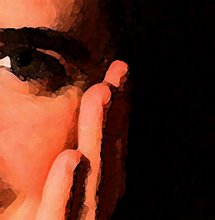Purim is around the corner. The protagonist of this holiday is Esther who, via a nationwide search for beautiful women, becomes the wife of Persian King Ahasuerus but conceals her identity as a Jew. Later, when the Jews are threatened by Haman, Esther risks her life by asking the king to save her people (click here for the whole megillah). Today we celebrate Purim by dressing in costume, wearing masks, and making a ton of noise to drown out the name of Haman when the story is read aloud in synagogue. And of course we eat.
On Sunday, my Rosh Chodesh group gathered to celebrate the month of Adar, in which Purim falls. In addition to nourishing ourselves with an extraordinary array of snacks we contemplated the masks that we wear on a regular basis, and why. These are masks of false cheer or bravado, masks of authority, masks of indifference. Often we aren't even aware that we have a mask on, so quickly do the muscles in our face shift into a certain position. To a certain degree, all of us walk around incognito part of the time, disguising our true feelings and authentic natures so as to protect ourselves from judgment, ridicule or the demands of others.
To emphasize the point, we made masks of each other's faces by applying strips of plaster soaked in water to a partner's vaseline-coated visage. Lying on the floor as my partner built my mask, the beginning of the process felt as relaxing as a spa treatment - the wet bands of plaster were soothing on my skin, there was music and conversation nearby. But as my partner built the layers and the plaster began to harden, it was if the spa had morphed into an ICU and I was the subject of an emergency medical procedure. Increasingly I felt trapped and stifled. While I could still breathe, I could no longer open my mouth to speak, and my face felt like it was immobilized beneath the increasingly firm plaster shell. When it was dry enough to be removed, it felt like a mini-liberation, an echo of the more profound unmasking of myself that I experienced at the Hoffman Institute.
Although most of our daily social masks don't leave us feeling as if we are trapped under plaster, some people who have maintained a particular mask for years have difficulty opening their mouths wide or registering spontaneous emotion on their face. After our masks had dried, we sat in a circle and each of us had a chance to tell the other women something about ourselves that most people don't know, or a reason we hide behind masks in the first place. Some of the responses were surprising. It was an excellent reminder for me to be more conscious of the masks I wear, to remember to take them off from time to time and to realize that, much of the time, other people are wearing them, too.
Tuesday, March 11, 2008
Subscribe to:
Post Comments (Atom)




No comments:
Post a Comment